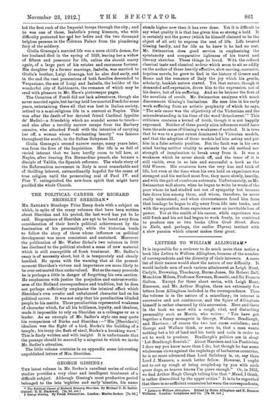THE POLITICAL CAREER OF RICHARD BRINSLE Y S HERIDAN.* MR.
SADLER'S Stanhope Prize Essay deals with a subject on which, in spite of the many volumes that have been written about Sheridan and his period, the last word has yet to be said. Biographers of Sheridan are apt to be lured away from consideration of their hero's political achievement by the fascination of his personality, while the historian tends to follow the story of those whose influence on political development was more consistent and sustained. Moreover the publication of Mr. Walter Sichel's two volumes in 1909 has disclosed to the political student a mass of new material which is still susceptible of fresh treatment. Mr. Sadler's essay is of necessity short, but it is temperately and clearly handled. He opens with the warning that at the present moment Sheridan's virtues and importance are more likely to be over-estimated than undervalued. But as the essay proceeds he is perhaps a little in danger of forgetting his own caution. He emphasizes with justice the prejudice and untrustworthi- ness of the Holland correspondence and tradition, but he does not perhaps sufficiently emphasize the inimical effect which Sheridan's own erratic and unbalanced character had on his ptditical career. It was not only that his peculiarities blinded people to his merits. These peculiarities represented weakness of character which, for all his brilliance, loyalty, and idealism, made it impossible to rely on Sheridan as a colleague or as a leader. As an example of Mr. Sadler's style one may quote his comparison of Burke and Sheridan :—" His [Sheridan's] idealism was the flight of a bird, Burke's the building of a temple; his irony the flash of steel, Burke's a breaking wave." This is finely written and with insight. It is unfortunate that the passage should be marred by a misprint to which we invite Mr. Sadler's attention.
The little volume contains in an appendix some interesting unpublished letters of Mrs. Sheridan.














































 Previous page
Previous page